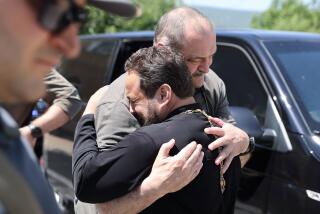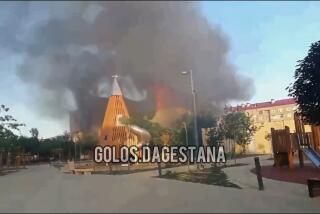Let’s Help Russia Against the Chechens
- Share via
Russia and the United States may not have all the same friends, but they certainly have some of the same mortal enemies. The horrendously bloody terrorist attacks in Russia and the invasion of the Russian republic of Dagestan by Chechen and radical Islamist forces make clear that Russia--and the traditional Muslim majority in Dagestan--are menaced by some of the same forces that for years have been attacking the U.S. and Israel in the Middle East and elsewhere.
This realization should prompt a rethinking by both sides of U.S.-Russian relations. There needs to be far less unnecessary rivalry--and far more cooperation--against common threats. Reports that the FBI is helping Russia respond to the terror campaign, if true, are greatly to be welcomed.
The Russian security services have alleged that Osama bin Laden himself is backing the latest Chechen and Islamist campaign. This may or may not be true, and in any case is largely irrelevant. Bin Laden is only the most prominent figure in the Sunni extremist network, which extends from Sudan to Pakistan. Rather than a hierarchical “organization” with a “leader,” this is a web of groups and individuals sharing the same basic values and goals. These include hatred of the West and of Israel--and hatred of Russia, at least since the Soviet invasion of Afghanistan in 1979.
Many of the Islamist fighters received their first military experience fighting with the Afghan moujahedeen against the Soviet forces. Today, they support the Taliban regime in Afghanistan, which is giving shelter to Bin Laden.
As fundamentalist Sunnis, they are also, it may be noted, strongly hostile to Shiite Iran. Last year, Iran came close to an invasion of Afghanistan after Iranian diplomats there were killed by Taliban forces.
The growth of these forces in the northern Caucasus has come as a result of three main factors. The first was the Chechen War of 1994-96, when the Chechen cause naturally attracted the sympathy of many Muslims. During the war itself, a small number of Arab and Afghan volunteers fought on the Chechen side under the command of Khattab, an Arab who is now one of the leaders of the attack on Dagestan. Shamil Basayev, the legendary Chechen commander and co-leader of the Dagestan operation, has said that five Arab fighters and three Turks were killed there in August.
The real growth of modern radical Islam--or “Wahabism,” as it is known in the region--has come since the Chechen war. It has been produced by the effect of Gulf Arab money, and the prestige of modern fundamentalist teaching, in a bitterly poor region. In war-ravaged Chechnya, but also to a lesser extent in Dagestan as well, the formal economy has collapsed. Thousands of heavily armed young men have no employment other than to fight. The appeal of religious discipline and certainties also has been increased by the breakdown of social traditions and the rise of organized crime.
During the Chechen war, I had great sympathy with the Chechen struggle for independence, which I covered for The Times of London. Russia’s heavy share of responsibility for the present desperate state of Chechnya cannot be denied.
Nonetheless, in the present struggle, Russia is basically in the right. Basayev, Khattab and their forces are in opposition to their own president, Aslan Maskhadov, who, after leading the Chechen forces against Russia, was elected president of Chechnya in 1997 with 65% of the vote. The Basayev and Islamist fighters are therefore no longer a “liberation force,” and the situation is completely different to that of Chechnya in 1994-96. Indications are that they are opposed by a majority of Chechens, who are thoroughly tired of the insecurity and chaos that have afflicted Chechnya for so many years. They definitely are opposed by the great majority of Dagestanis, who are angry with the brutality and incompetence of the Russian forces but fear the Chechens on ethnic grounds and the “Wahabis” as a threat to the traditional, Sufi Islamic traditions of Dagestan.
The Dagestani government of Mahomedali Mahomedov and a large majority of the elected representatives of Dagestan’s 34 nationalities want Dagestan to continue as a member of the Russian Federation. Because of this, an Islamic revolution in Dagestan would threaten appalling bloodshed both in Russia proper and in the Caucasus. Russia deserves U.S. help in meeting this threat.
More to Read
Sign up for Essential California
The most important California stories and recommendations in your inbox every morning.
You may occasionally receive promotional content from the Los Angeles Times.










